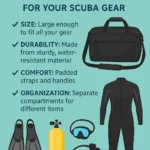
How to Choose the Right Dive Bag for Your Scuba Gear
October 9, 2025Tioman Dive Buddy Review: Best Choice for Beginners in Genting? (2025 Guide)
January 27, 2026🤿 Top 5 Common Scuba Gear Mistakes and How to Avoid Them
Scuba diving is all about preparation and precision — and your gear plays a crucial role in every safe and enjoyable dive. Unfortunately, even experienced divers sometimes make small mistakes with their equipment that can lead to discomfort, stress, or even safety issues underwater. Let’s explore the top five common scuba gear mistakes and how to avoid them like a pro.
1. Skipping Proper Gear Checks Before Diving
Many divers assume that if their gear worked fine on the last dive, it’ll work again today. This is one of the most common — and dangerous — mistakes. O-rings can crack, hoses can loosen, and small leaks can develop between dives.
2. Using Ill-Fitting Gear
Uncomfortable masks, oversized fins, or tight wetsuits can quickly turn a fun dive into a frustrating experience. Improperly fitted gear also affects buoyancy and performance underwater.
- Masks: Should seal properly without overtightening the strap.
- Fins: Should fit snugly but not cause pressure points.
- Wetsuits: Should fit like a second skin — no baggy spots or folds.
3. Neglecting Regular Maintenance
Your scuba gear requires care and servicing just like any precision equipment. Regulators, BCDs, and dive computers are mechanical devices that can fail if ignored. Many divers skip annual servicing or delay rinsing their gear after dives, leading to salt corrosion and reduced lifespan.
- Rinse all gear with fresh water after every dive.
- Have your regulator serviced at least once a year by a certified technician.
- Check BCD inflator and dump valves regularly for leaks or sticking.
4. Poor Packing and Storage Habits
Stuffing your gear into tight spaces or storing it wet is a recipe for damage and mold. Dive bags should be packed properly to protect fragile equipment like regulators and computers.
5. Ignoring Small Gear Issues
Loose straps, frayed hoses, or leaking inflators are often dismissed as “minor problems.” In reality, these small issues can quickly become big ones underwater where it’s harder to fix them. Always address any damage before your next dive.
- Inspect your BCD, regulator, and hoses regularly.
- Replace worn mouthpieces and O-rings immediately.
- Don’t dive with broken or makeshift repairs.
Final Thoughts
Taking care of your scuba gear isn’t just about extending its lifespan — it’s about ensuring your safety and comfort underwater. By avoiding these five common mistakes, you’ll dive more confidently, conserve energy, and fully enjoy every moment beneath the waves.

